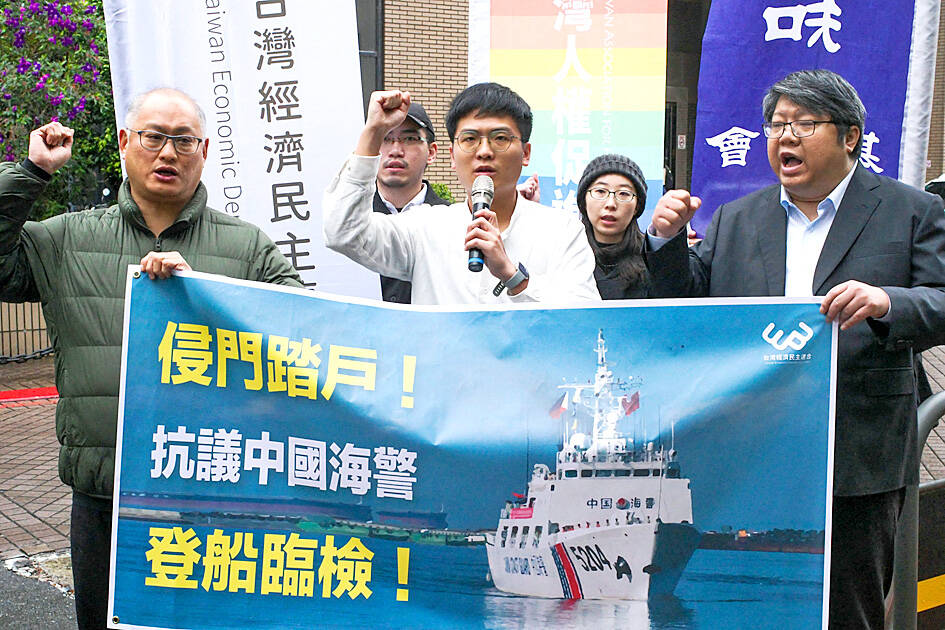Human rights campaigners yesterday protested in front of the Association for Tourism Exchange Across the Taiwan Straits’ office in Taipei, accusing the China Coast Guard of breaching Taiwanese sovereignty over the waters around Kinmen County by boarding and inspecting a Taiwanese tourist boat on Monday last week.
The association is a semi-official representative office of China in Taiwan handling tourism-related affairs.
The protesters called on Taiwanese to refrain from visiting China in the face of Beijing’s increasing hostility toward those who do not espouse its “one China” principle.

Photo: Sam Yeh, AFP
China Coast Guard officers boarded the Taiwanese tourist boat as political vengeance for the deaths of two Chinese fishers, who had been operating an unregistered fishing boat and illegally crossed into Taiwan’s restricted waters, Taiwan Economic Democracy Union deputy secretary-general Hsu Kuan-tze (許冠澤) said.
“It was only normal for Taiwan’s Coast Guard Administration to enforce the law in our own waters. While Taiwanese prosecutors are still investigating the incident on Feb. 14, China on Feb. 18 announced that it would begin regular patrols in waters between Kinmen County and China’s Xiamen City, and boarded a Taiwanese tourist boat the next day. China’s Taiwan Affairs Office also supported the China Coast Guard, saying that no restricted waters exist between Kinmen and Xiamen,” Hsu said.
A series of responses from China to the two fishers’ deaths showed its complete disregard for Taiwan’s sovereignty over the waters around Kinmen and its malicious intent to provoke Taiwanese law enforcement personnel, he said.
“We should not become accustomed to Beijing’s constant breaches of the nation’s sovereignty,” he added.
Chinese frequently entered waters near Kinmen and Lienchiang County (Matsu) to engage in illegal behavior, including fishing and sand dredging, Taiwan Economic Democracy Union convener Liang Chung-chiang (賴中強) said.
The Coast Guard Administration has been dealing with these offenses within the boundaries of the law, but it has failed to stop China from frequently challenging the “status quo” in the Taiwan Strait, he said.
China’s moves to create a new “status quo” and negate Taiwanese sovereignty and power to enforce the law include its unilateral change of the M503, W122 and W123 aviation routes, which took effect on Feb. 1, he said.
Not responding to Chinese bullying would only encourage it to push the envelope, and Taiwanese could gradually become numb to such behavior, like a frog being slowly boiled alive, he said.
Taiwanese should avoid visiting China unless it is absolutely necessary, he said, vowing to launch a large-scale boycott of China if it shows neither remorse nor any improvement.
Taiwan Economic Democracy Union manager Lee Ming-che (李明哲), who served a five-year sentence in China after being charged with “subversion of state power” and returned to Taiwan in 2022, said that Chinese coast guards boarding a Taiwanese China has for human rights.
“Laws in China are defined by leaders of the Chinese Communist Party and do not have identical standards across the board. Casual conversations and conduct of ordinary people could easily be interpreted as intentions to commit a crime,” he said.
As such, not only is it dangerous to travel to China, it is also dangerous to travel to countries that have extradition agreements with China or Hong Kong, he added.

Chinese Nationalist Party (KMT) Chairman Eric Chu (朱立倫), spokeswoman Yang Chih-yu (楊智伃) and Legislator Hsieh Lung-chieh (謝龍介) would be summoned by police for questioning for leading an illegal assembly on Thursday evening last week, Minister of the Interior Liu Shyh-fang (劉世芳) said today. The three KMT officials led an assembly outside the Taipei City Prosecutors’ Office, a restricted area where public assembly is not allowed, protesting the questioning of several KMT staff and searches of KMT headquarters and offices in a recall petition forgery case. Chu, Yang and Hsieh are all suspected of contravening the Assembly and Parade Act (集會遊行法) by holding

PRAISE: Japanese visitor Takashi Kubota said the Taiwanese temple architecture images showcased in the AI Art Gallery were the most impressive displays he saw Taiwan does not have an official pavilion at the World Expo in Osaka, Japan, because of its diplomatic predicament, but the government-backed Tech World pavilion is drawing interest with its unique recreations of works by Taiwanese artists. The pavilion features an artificial intelligence (AI)-based art gallery showcasing works of famous Taiwanese artists from the Japanese colonial period using innovative technologies. Among its main simulated displays are Eastern gouache paintings by Chen Chin (陳進), Lin Yu-shan (林玉山) and Kuo Hsueh-hu (郭雪湖), who were the three young Taiwanese painters selected for the East Asian Painting exhibition in 1927. Gouache is a water-based

Taiwan would welcome the return of Honduras as a diplomatic ally if its next president decides to make such a move, Minister of Foreign Affairs Lin Chia-lung (林佳龍) said yesterday. “Of course, we would welcome Honduras if they want to restore diplomatic ties with Taiwan after their elections,” Lin said at a meeting of the legislature’s Foreign Affairs and National Defense Committee, when asked to comment on statements made by two of the three Honduran presidential candidates during the presidential campaign in the Central American country. Taiwan is paying close attention to the region as a whole in the wake of a

OFF-TARGET: More than 30,000 participants were expected to take part in the Games next month, but only 6,550 foreign and 19,400 Taiwanese athletes have registered Taipei city councilors yesterday blasted the organizers of next month’s World Masters Games over sudden timetable and venue changes, which they said have caused thousands of participants to back out of the international sporting event, among other organizational issues. They also cited visa delays and political interference by China as reasons many foreign athletes are requesting refunds for the event, to be held from May 17 to 30. Jointly organized by the Taipei and New Taipei City governments, the games have been rocked by numerous controversies since preparations began in 2020. Taipei City Councilor Lin Yen-feng (林延鳳) said yesterday that new measures by